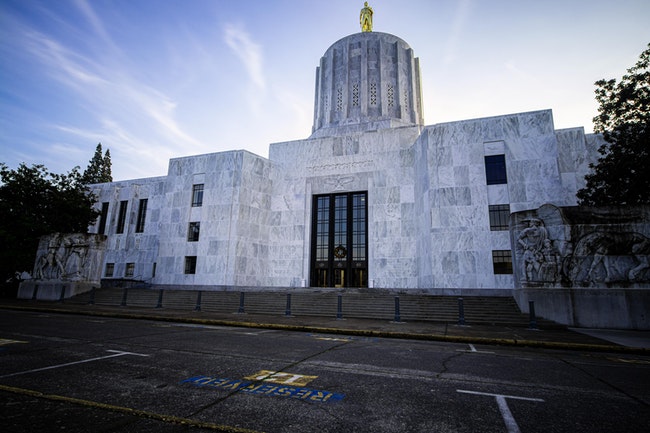
Two bills being considered by Oregon lawmakers this session are expected to be the one-two punch the state needs to considerably reduce the impact of wildfire on its landscape and citizens.
In recent years, the onslaught of smoke from major wildfires has choked many parts of the state through the summer months. Fires threaten homes where forests meet urban sprawl, and timber owners are losing precious resources for renewable building material and wood products.
Wildfire is one of the preeminent threats to Oregon’s way of life in a multitude of ways, but the state is hoping this year it can make headway in minimizing its effects through an approach that takes both the short term and future into account.
The first is a bill – Senate Bill 1514 – creating 15 projects to be led by the state Forestry Department that would clear trees, underbrush and other forest material considered to be “fuel” for wildfire. The projects would take place in locations across the state determined by the department within the 5.2 million acres identified as high-risk areas by the Governor’s Council on Wildfire Response. The projects would be funded by a $25 million allocation laid out within the bill.
The second bill – Senate Bill 1536 – would overhaul the state’s approach to fire mitigation and suppression and help communities adapt to smoke and fire.
It includes a lengthy list of new policies and regulations around:
· Assessing wildfire risk for utilities and having them create their own mitigation plans.
· Bolstering fire insurance and setting standards that encourage homeowners near forests to harden their homes against fire.
· Creating new positions within the state Office of Emergency Management to administer new mitigation and recovery efforts.
· Mitigating the health effects of smoke by helping homeowners in smoke-prone areas retrofit their homes with filtration systems.
· Establishing minimum standards of defensible space around homes.
· Setting a goal to annually treat 300,000 acres of forest and remove fuels to prevent fires from growing too large.
· Developing Oregon’s forestry workforce.
· Requiring the State Fire Marshall and State Forester to help local jurisdictions, landowners, businesses and individuals create new wildfire service districts, or expand and adjust current ones, as well as providing financial help.
It’s unclear just how much the bill would cost or where that money would come from. A fiscal impact statement found the proposal needs further work by the Legislature’s budget committee, but Governor’s Council estimated the cost approximately $4 billion over the next 20 years, or about $200 million a year.
It’s a robust approach to many aspects of the conversation the Governor’s Council and legislators continue to have around reducing the impact of wildfire. But a party-line vote in the Senate Wildfire Committee last week to send both bills into the budget committee indicates Republicans might not have the appetite to tackle the entire plan now.
The bill has a lot of moving pieces, and the version passed by the committee includes everything but one provision on land use. House Bill 4054, sponsored by Rep. David Brock Smith, R-Port Orford, creates an advisory committee within the Department of Land Conservation and Development to review land use policies related to wildfire.
Sen. Herman Baertschiger, Jr., R-Grants Pass, committee vice-chair and Senate Republican leader, failed in his attempts to amend the bill to drop several sections.
Baertschiger said he’s concerned the bill does too much at once and needs more discussion on certain policy and funding aspects. He pointed out that he’s not attempting to derail the effort but be realistic about what’s feasible, especially at the budget committee.
“Ways and Means has already told me there’s not a lot of money, so I want something we can get through the process,” he said. “I don’t want something that dies at the end of the session stuck in ways and means. That’s my bottom line.”
Golden is more optimistic.
“We’re talking about significant dollars, and of course, the wildfire council’s even talking about a lot more money over time, but I think all this work we’ve been doing makes for a pretty strategic launch,” he said. “The question is how much agreement is there that this is a tier-one emergency.”
Golden said he believes there would be no question of the emergency around wildfire and support for this bill had 2019 fire season been as bad as the two previous years. With the state removed from the devastating fires and noxious smoke levels in 2017 and 2018, he thinks the bill is a bit tougher of a sell. It comes down to what can wait for lengthier policy discussions in the 2021 Legislature, and what needs to be done now.
According to State Forester Peter Daugherty, waiting isn’t the best option.
“A lot of people would say, we’ve been waiting a number of years with fuel build ups and have known about the conditions for almost a decade and of the need for fuel reductions and restoration on federal lands,” Daugherty said.
Testimony from several groups and local governments raised issues over mandating fuel treatments and dealing with the federal government for projects on national forests.
According to Daugherty, those partnerships are in place and the state’s relationship with the federal government is strong.
“They would love it for us to come in. We just recently signed a shared stewardship agreement about how we’ll operate with the goal of having much more state influence,” Daugherty said. “We have mutual goals in terms of healthy, resilient forests.”
Golden and Daugherty said they believe the “historic” deal between timber interests and environmental groups announced last week would have a positive bearing on discussions around wildfire investment.
“I had some concern that the wounds from the timber wars were going to get in the way of this wildfire work,” Golden said.
Moving forward, Golden and his committee members will watch the budget committee’s schedule and discussions on funding the bill.
With wildfire a major priority for Gov. Kate Brown, Democrats on the budget committee likely will keep step, but Republicans aren’t quite as convinced the bill should be addressed now.
“This is just too much too soon,” said Sen. Kim Thatcher, R-Keizer, a member of the Senate Wildfire Committee. “I might have been on board with a lot of this, but I just don’t want to commit to something I don’t fully grasp yet.”
Contact Reporter Sam Stites: [email protected] or 971-255-2480.









